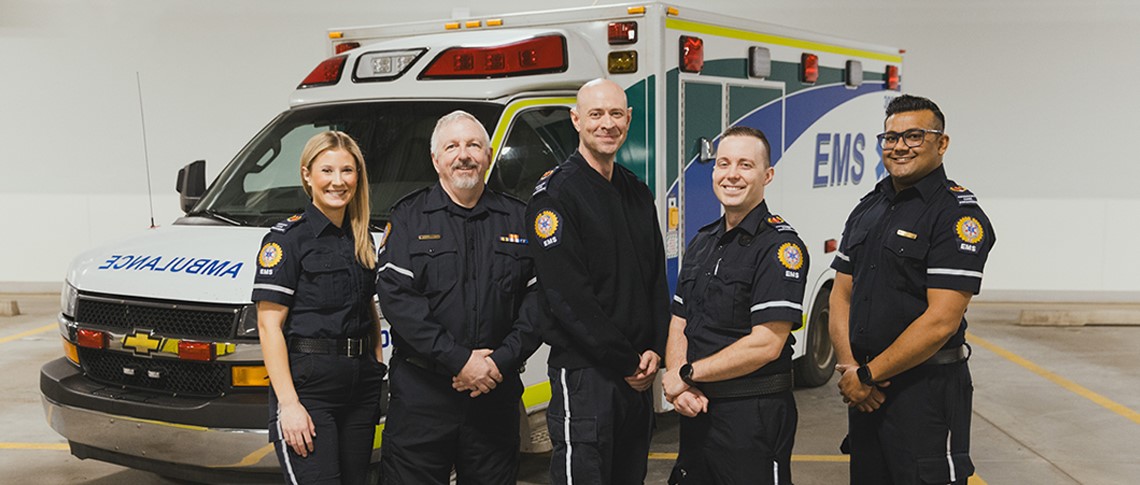

Emergency Medical Services (EMS) offers a fast-paced and engaging career, with unlimited options to grow as a professional. Work in different environments across Alberta from urban centres to remote rural communities or provide care during unique situations as part of a specialized team.
“You can be working in the city; you can be working in the country. There's always a challenge. There's always something new to learn. So that makes things exciting,” says Teri Yurkewich, an Advanced Care Paramedic and Air Ambulance Paramedic. “Working for EMS has allowed me to work from northern Alberta to southern Alberta, from grasslands to mountain regions and everything in between,” Teri adds.
“It definitely helps to reflect on yourself and know what you want to do in the future,” says Adam Stachal, an Advanced Care Paramedic and Supervisor in the Edmonton Zone. “You have those options where if you wanted to progress up to leadership, and in some areas there's a lot of different teams, with specialties that you can use to expand or deepen your practice – those options are there.”
Some specialized teams in Alberta provide care for patients being transferred between health facilities or transported home, or provide acute care to patients with specific health conditions, such as strokes, Ebola, or in high-stakes air ambulance transport. AHS EMS may also provide emergency medical coverage for special events, from small-town rodeos and festivals to those in major centres, for example, Edmonton’s K-Days or the world-famous Calgary Stampede.
There are lots of options for EMS staff to specialize in different forms of care, for example, some teams provide in-home support to patients as part of the community paramedic team.
“Community paramedics really broadened my scope in primary care,” says Denise Van Der Kooi, an Advanced Care Paramedic. “Rather than rushing people to the hospital, we were staying in their residence and formulating treatment plans – just like you would in the hospital. It enhanced my critical thinking and developed my ability to make treatment plans. I also really liked being collaborative with my teammates and the physician team to really bring that big picture in for the client.”
“The people in my department really advocate for education. I was able to apply to the scholarship foundation, and was awarded some scholarship money,” says Advanced Care Paramedic Rhea Bell. “While I was starting my master's, I discussed the time commitment and things that might affect my work with my boss. My leaders were extremely supportive and helped me speak with people across the organization and get the statistics that I needed for my thesis,” she shares. Bell has also worked on the Women in EMS Leadership Workforce Resource Group which works to support and empower women to enter EMS leadership positions.
“I love teaching,” shares Thaha Noorudin, a Primary Care Paramedic. “In the future, my goal is to do that and maybe join the learning and development team. One of my core values is helping to inspire and grow the next generation – help them get their foot in the door and become better practitioners, better paramedics.” This work can include providing clinical education and training simulations for specific equipment or practicing specific procedures – before an emergency calls for it.
Whether you start out with the goal of leading or teaching or decide to later in your career, many emergency professionals want to contribute to their field on a larger scale.
“I think some of my favorite moments have been being able to work in research, through work and furthering my education, being able to learn through opportunities,” shares Rhys Clark, Primary Care Paramedic. While research positions are somewhat rare, there is regular information gathering and projects undertaken in the spirit of continuous improvement. The Edmonton Zone’s stroke response team had originally started as a pilot project and is still delivering improved patient outcomes for people who have suffered a stroke.
“I also like the challenges of supervising. When I'm on truck, I'm focusing on one patient. But now that I'm supervising, I'm supporting my crews. So, I am focusing on their patients too, because they have crews that can help support and aid them in doing whatever they need – and that turns into better patient care.”
If you love to always be learning, you can grow your EMS career at AHS. “I'm a really big fan of education and being that lifelong learner, and that doesn't necessarily mean formal education,” shares Bell. “It can be within the organization; it can be from your peers. And I think that’s exciting.”
Find your calling! Learn more about EMS career opportunities across the province.